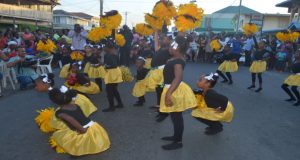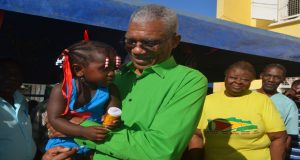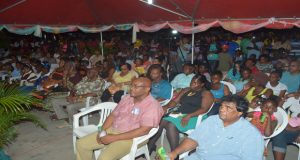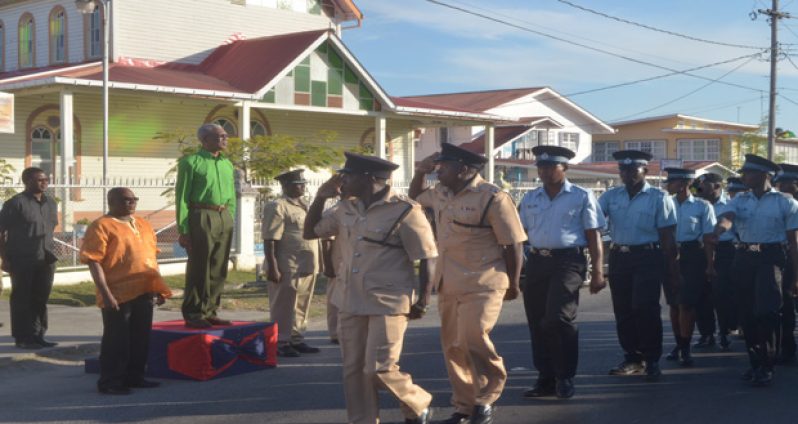PRESIDENT David Granger visited the East Berbice, Corentyne region yesterday and he left New Amsterdam, which he called “The Queen of the Region”, with five pillars on which to build a model town that would generate massive income for the economic development of Guyana.Delivering the feature address before hundreds who witnessed the launching of the inaugural New Amsterdam Town Week celebrations, Granger pointed out that while Region 6 is uniquely “a  frontline region”, being the only place where two Caribbean countries touch each other, it can become the most commercially productive, with booming rice and fish industries, with New Amsterdam as the most central of the region’s three towns.
frontline region”, being the only place where two Caribbean countries touch each other, it can become the most commercially productive, with booming rice and fish industries, with New Amsterdam as the most central of the region’s three towns.
New Amsterdam has the potential to be the centre of commercialism in Guyana, if coupled with its rich history and accomplishments, it develops a safer, more organised and welcoming environment.
URBAN REVIVAL
He visualises Town Week as an opportunity to bring development visions to the table and for stakeholders to make decisions for an urban revival, beginning with the development of a model physical character.
“Let us begin tonight to lay a foundation for the revitalisation of this community. We want New Amsterdam to be well laid out, to be well drained (and) to be a well zoned town… The mayor and councillors must make New Amsterdam a ‘green town’.”
Emblematic with his inaugural environmental cleansing campaign as President, he threw out the challenge that littering must no longer be associated with New Amsterdam and the bottles and cups, plastic and Styrofoam must be pulled out of gutters and trenches first of all.
The community must be re-designed with richer vegetation and the planting fruit and breadfruit trees for beautification and business benefits.
“When I say ‘green’, I mean sanitation. I want to see trees; I want to see a boulevard. We have to plant up New Amsterdam with fruit trees; breadfruit trees. Let us keep it looking clean and green. The whole town should come out planting.” And litterbugs, he said, must be penalised and children should be trained to maintain a healthy environment by the various institutions, beginning at home.
He referred to a saying of the Amerindians that, “trees hold up the sky”, indicating that planting trees will enrich and elevate communities.
Using Bartica as an example, Granger explained that the Region 7 community, which is soon to be officially named a town, has supported the National Tree Day October 3 activities, where each of some 3,000 households decided to plant a breadfruit tree. This move he said will be profitable in the end.
“We calculated that if every household in Bartica planted one breadfruit tree, when that breadfruit tree matures, Bartica would be able to produce a million pounds of breadfruit a year.”
BUSINESS CENTRE
The nation’s business centre is what the President said New Amsterdam could become if it builds on its existing commercial foundation. This, he said, is the second pillar on which to progress.
New Amstardam has to be the pillar of business again as it is situated in one of the most commercially vibrant regions in Guyana.
“You produce the most fish in this country, you produce some of the best rice in this country [and] sugar,” he reminded, adding that bauxite and timber also come out of Berbice River.
He added: “Your commerce must enrich this town. People must come here to do business. I want to see New Amsterdam being the commercial hub,” where international business people visit through a nearby aerodrome to “do business and cut deals”.
The town must be “a boom town” and “the commercial capital of a booming economy… a place for investment… You have the capability to have a strong, legitimate economy. You’re a better place than any other region for commerce. Let us use your natural advantage to make the East Berbice/Corentyne region a commercially advanced region in this country,” Granger stated.
ORDER AND SAFETY
Meanwhile, he listed the third and fourth pillars as orderliness and safety, being important attributes in attracting visitors. He noted that nobody wants to come to a place where there is an obvious threat of crime, and citizens must collaborate with the police to ensure a safe town.
Citizens should communicate with the Neighbourhood Police, giving them bicycles so that they can make the town safer, and learn to help themselves instead of just blaming the crooks and criminals.
“Let us work with the divisional commander to make this town a place that people want to come for Town Week, for entertainment any day of the week, and time of the month, any month of the year, but they must feel safe and secure.”
Instead of emphasising on what they do not have, residents should appreciate and take full advantage of the facilities they have. Berbice has the New Amsterdam Prisons, the High Court, the University of Guyana Berbice campus, and other facilities that many other regions do not.
“Let us make use of those facilities to give our people that good life” and problems should be solved by all stakeholders developing rapport and instituting decisions.
“You don’t have to wait for central government. You can do it here if you show the vision and the energy. The solution is in your hands,” he stated.
Lastly, Granger said Region 6 must be a services town, with offices to distribute licences, passport and birth certificates, thereby developing a sense of regionalism.
He cited the lack of services as the reason that Region 6 has a rapid population decrease and recommended solutions. “People are migrating. People are abandoning lands and homes. You have to create a virtual cycle in which people are to come back and invest. [Have a] strong un-bribable service.”
He said Town Week is not a time for having the “highest rate of consumption of Guinness” in the country, a cryptic reference to widespread alcohol indulgence, but a time to make Guyana a place where people want to come and do business.



.jpg)









